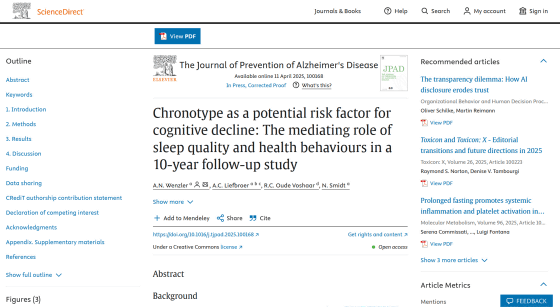Highly educated people may be at higher risk of cognitive decline due to a night-time lifestyle

As life expectancy increases and populations age around the world, maintaining cognitive function is more important than ever. New research suggests that more highly educated people may be at higher risk of cognitive decline due to a night-time lifestyle.
Chronotype as a potential risk factor for cognitive decline: The mediating role of sleep quality and health behaviors in a 10-year follow-up study - ScienceDirect

Night Owls May Be at Higher Risk of Cognitive Decline. Here's Why. : ScienceAlert
https://www.sciencealert.com/night-owls-may-be-at-higher-risk-of-cognitive-decline-heres-why
In modern society, it is important to know whether your lifestyle is that of a 'morning person' who goes to bed early and gets up early, or a 'night person' who goes to bed late and gets up late. Sometimes, social demands such as work start times and childcare schedules do not match your lifestyle. This can lead to social jet lag, where there is a discrepancy between weekdays, when there are many social demands, and weekends, when there are fewer demands.
Disruption of the circadian rhythm , which regulates physiological phenomena on a 24-hour cycle, has been linked to dementia. A research team from the University of Groningen in the Netherlands analyzed data from 23,798 people enrolled in the Dutch Public Health Research Database.
The research team tracked the sleep habits of subjects aged 40 and over for an average of 10 years and compared the changes in cognitive test scores, such as the Ruff Figural Fluency Test (RFFT), which evaluates non-verbal cognitive ability. The researchers examined the relationship between sleep habits and cognitive decline, and the effects of related factors such as age, education, and other factors.

Of the subjects, 32.8% were in the 'highly educated group' (those who graduated from a university or
The low-education group was slightly older than the middle- and high-education groups, and was more likely to be smokers and abstainers, and to have higher levels of physical activity. On the other hand, the high-education group was more likely to be male, and to have mild and severe alcohol disorders. The mean baseline RFFT score (0-175) was 90.3 for the high-education group, 82.0 for the middle-education group, and 73.4 for the low-education group.
Analysis of the relationship between changes in RFFT scores and sleep habits showed no significant correlation between sleep habits and changes in RFFT scores in the low and middle education groups. On the other hand, in the high education group, there was a tendency for the RFFT score to decrease by 0.80 points 10 years later for every hour that the lifestyle rhythm shifted toward night-time.
Among the highly educated, 13.52% of the association between sleep habits and lower RFFT scores was partially mediated by sleep quality, and 18.64% was partially mediated by current smoking. On the other hand, physical activity, past smoking, and alcohol intake did not explain the association between sleep habits and lower RFFT scores.

One possible reason why highly educated people with night owls are more likely to have declining cognitive function is that they are more likely to have jobs with fixed working hours such as 9am to 5pm, so they have to get up early even if they stay up late. It is also possible that the decline in cognitive function is more pronounced because their original cognitive level is higher, or that the small number of morning types in the study sample may have been a factor.
'Our results suggest that more highly educated subjects with evening chronotypes experience greater cognitive decline,' the team wrote. 'Over the 10-year follow-up, we found that for every hour of eveningness in the highly educated group, cognitive function declined by 0.80 points. With a nine-hour difference between the minimum and maximum chronotypes, the most extreme evening types would be expected to experience a decline of up to 7.2 points in their RFFT scores.'
in Science, Posted by log1h_ik